The Battle of the Solomon Islands
No, this is not about the Solomon Islands naval battle during WWII (see link). This is something that happened quite recently.
(Reuters) Solomons hell for Chinese. April 20, 2006.
Australian and New Zealand troops and police have landed in the troubled capital of the Solomon Islands to try to quell two days of rioting and looting sparked by the election of a prime minister who foes say is being funded by Taiwan. Rioters claimed the new government of Snyder Rini, who was elected by secret parliamentary ballot Tuesday, would be heavily influenced by the government in Taipei, which the Solomons recognizes diplomatically, and businessmen among some 2,000 ethnic Chinese in the South Pacific nation's 538,000 population.
... As more troops and police from his country headed for the Solomons, Australian Foreign Minister Alexander Downer also raised the idea that there was a Taiwan factor at work. "Some of this rioting was sparked by allegations made by Snyder Rini's political opponents that he was in receipt of Chinese - meaning, I think, largely Taiwanese money," he said on Australian television. But Rini said from an undisclosed location that "there is no influence at all by outsiders. The best way to deal with these issues is not outside in the streets. They should come and we will have dialogue."
... Honiara's Chinatown district was mostly razed in the violence. Families living above their stores jumped for their lives from burning buildings and swam across a nearby river to escape rioters late Tuesday, the Solomon Islands Broadcasting Corporation reported. Minor injuries were reported among residents.
China and Taiwan have long battled for diplomatic recognition from South Pacific nations. A recent Australian Senate report on China said the diplomatic competition could hurt political stability and economic development in the South Pacific. It described the rivalry between Beijing and Taipei as a "Pacific Cold War," with both using "check book diplomacy."
(Adelaide Advertiser) Concern over 'buying' islanders. Ian McPhedran. April 26, 2006.
Australia has bluntly warned Taiwan and China against playing money politics in poor Pacific countries. Government agencies have raised grave concerns that some politicians involved in last week's Solomon Islands uprising were on Taiwan's payroll. Chinese nationals and businesses were targeted in violent riots. There is also alarm about China's growing influence across the Pacific.
Both countries are engaged in a race to influence countries such as Papua New Guinea and small island states. According to senior government sources, Taiwan has adopted the direct approach by allegedly paying off individual politicians while China has given funds to community projects.Foreign Affairs Minister Alexander Downer said the Government had discussed Pacific affairs with both China and Taiwan. "The point we always make to China is that we don't want to see chequebook diplomacy entering into the Pacific," he said. Mr Downer said any funding of politicians or political parties would be damaging. "It is completely unacceptable for other countries . . . to be funding politicians directly," he said.
Now there are many more insinuations against China and/or Taiwan (see, for example, ABC). But this is not my interest here, because I have no means of sorting out who is telling the truth. Instead, I will look at the public perceptions of China and Taiwan in the aftermath of this incident, especially among the Chinese communities around the world.
First, what do you suppose the rest of the world (especially all persons of Chinese descent) care about? They really don't care too much about dirty money and rigged elections in the Solomon Islands. I mean, REALLY!!! Rather, they are moved by these kinds of photographs coming out of the Solomon Islands.
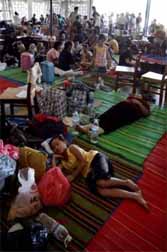
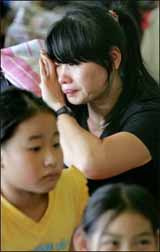
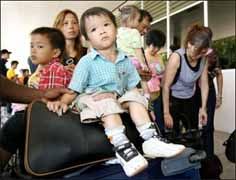
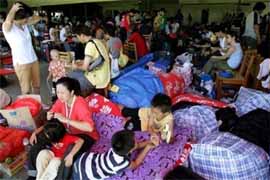
From Taiwan:
(ETTV) April 20, 2006.
台灣被指射介入索羅門大選,外交部也鄭重澄清,台灣外交部發言人呂慶龍說,「被燒毀的商店,所謂的華商商店,這些人是大陸去的,老僑所開的,不是台灣去的台商,這是第一個。 我們也注意到媒體對我們不實的指控,我們樂於見到邦交國民主的深化,但是我們不會介入當地的選舉。」
(in translation) Taiwan has been accused of interfering with the election in the Solomon Islands. The Foreign Ministry made a solemn clarification through its spokesperson Michael Lu: "The stores that were burned down -- the so-called stores owned by Chinese merchants -- those people are old Chinese immigrants who came from mainland China and not Taiwan merchants who came from Taiwan. That is the first thing. We are also paying attention to the inaccurate charges made by the media against us. We are delighted to see those foreign countries which have diplomatic relations with us become more democratic, but we will not interfere with local elections."
(Taipei Times) April 21, 2006.
Taiwan yesterday again denied charges that it was involved in buying influence in the disputed election which sparked riots in the Solomon Islands this week. The announcement on Tuesday that former Solomon Islands deputy prime minister Snyder Rini had been elected prime minister led to the burning and looting of Chinese homes and businesses by mobs who rampaged through the capital Honiara.
"We would like to categorically deny that we provide any money to any political leaders in that country," said Gary Lin (林松煥), head of the economic and cultural development office that represents Taiwan in the Australian capital, Canberra. He was responding to comments made by Australian Foreign Minister Alexander Downer, who linked the riots to the ongoing power struggle between Taiwan and China for diplomatic influence across the Pacific.
"Some people have decided to take to the streets, particularly focusing on the Chinese community, because they believe that Snyder Rini has been supported by the Chinese," Downer said. "Not just ethnic Chinese on the Solomon Islands but by the Taiwanese as well -- the Solomon Islands having diplomatic relations with Taiwan," he said.
"I have noted some of the allegations but I must point out that Taiwan is not involved in any way in the election of the prime minister of the Solomon Islands," Lin said in a statement. "The instability of the Solomon Islands is deep-rooted. It is not Taiwan's fault," he said....
In Taipei, Ministry of Foreign Affairs Spokesman Michel Lu (呂慶龍) repeated yesterday that Taiwan was not involved in unrest surrounding the Solomon Islands' elections, and "we will find out why Taiwan is rumored to have been involved." Lu said there are only two Taiwanese shops in the Solomon Islands, one is a restaurant and the other a vehicle repair shop. "Neither shop is located in Chinatown and neither was affected by the wave of riots that targeted the local Chinese. This fact should tell people whether Taiwan is involved or not," Lu told the Taipei Times yesterday.
(VOA) April 24, 2006.
[in translation] Some of the overseas Taiwan citizens have gone to seek refuge in Australia and another ten more plan to leave this week. Taiwan Foreign Ministry spokesperson Michael Lu said that there were two families of ten persons in Honiria. The Foreign Ministry has assisted one family of six persons to get on a plane and leave for Australia last week. The Taiwan Foreign Ministry is paying attention to the local situation and will decide whether the ten relatives of the diplomatic and technical aid staff should leave for Australia on Friday.
Michael Lu emphasized that the Taiwan's evacuation work is unrelated to mainland China. The Solomon Islands has diplomatic relations with Taiwan, with a total of 31 Taiwan persons living there, including overseas Taiwan citizens and diplomatic and technical aid staff. No Taiwan citizens were injured during the attack on Chinatown last week. The two shops operated by Taiwan people were not located in Chinatown and did not suffer any damage.
From Hong Kong:
(Wen Wei Po) April 24, 2006.
(in translation)
Anti-Chinese riots broke out in the Solomon Islands and the Chinatown in the capital Honiara was turned into a waste land. Large-scale looting caused direct economic losses of US$10 million to the local Chinese people. For many Chinese immigrants, their wealth that was accumulated over decades was wiped out in one night. They have nothing now and they have no place to go.
Chairman Hu Jintao has asked the Foreign Ministry to concretely ensure the safety of all the Chinese people in the Solomon Islands. The Chinese government has made the resolute decision to evacuate the Chinese, including compatriots from Taiwan as well those Chinese persons who hold Solomon Islands passports. This type of evacuation is not usually seen internationally. This shows that China is a responsible major county with a philosophy of focusing on people, extending to the entire Chinese Diaspora whenever lives and properties are threatened.
The Solomon Islands is a country which has the so-called diplomatic relations with Taiwan. According to Australian Foreign Minister Alexander Downer, the riots in the Solomon Islands are connected to those local Taiwan-connected Chinese people being suspected of offering bribes in the local election. According to an Australian think-tank, the Taiwan government has been buying off the local political elite all along. According to the Solomon Islands Labour Party leader, "Taiwan's dirty money" was used to elect certain designated candidates. But the Taiwan government has denied all the related accusations. Furthermore, they have claimed that the attacked stores were owned by mainland Chinese immigrants and had nothing to do with Taiwan people. Therefore, they were indifferent to those overseas Chinese in the Solomon Islands and refused to offer assistance. This not only exposed the selfishness and cold-bloodedness of the Taiwan government, and it also showed that the Taiwan government is insisting on letting ideology take charge and drawing a political boundary within the overseas Chinese. The actions of the Taiwan government not only chills the hearts of the overseas Chinese, but it also makes those countries with which it has "diplomatic ties" feel that it is irresponsible.
By comparison, the mainland mother country did not care that the Solomon Islands was one of the countries with "diplomatic relations" with Taiwan. They offered to evacuate all Chinese including those from Taiwan and those who hold Solomon Islands passports. This broadmindedness that transcends the cross-strait confrontation reflects the people-oriented political philosophy of the Chinese government. It does not matter if the foreign county has diplomatic relations with China or Taiwan, as soon as the lives and properties of the overseas Chinese there are threatened, the Chinese government will lend a hand in a timely manner. I believe that that all overseas Chinese will feel the value, care and love of the country for them. It goes without say that it will increase the sense of dignity and unity among the Chinese across the world.
As of now, the Chinese government has chartered four flights in three days and evacuated almost 400 people from the Solomon Islands, including 20 persons from Hong Kong. After the anti-Chinese riots in the Solomon Islands, the special representatives from the Foreign Ministry posted in Hong Kong have maintained close contact with the Chinese embassies in the area as well as the Hong Kong SAR government in order to assist the Hong Kong people there. This is widely appreciated by those people and their relatives.
(Sing Tao) April 24, 2006.
(in translation)
Riots occurred in the Solomon Islands after the election the anti-Chinese activities there seriously threatened the lives and propoerties of the overseas Chinese people. The Solomon Islands do not have diplomatic relations with mainland China; instead, they have diplotmatic relations with Taiwan. In a time of emergency, the reactions of the governments across the Taiwan Strait can be said to be one hot and one cold, one active and one useless. The sharp difference is enough to make people pensive!
Although mainland China does not have diplomatic relations with the Solomon Islands, they quickly offered help to the overseas Chinese in a time of need and helped them to get out of the danger. We observe that mainland China was able to immediately do: (1) ask the government of the Solomon Islands to take effect measures against those undesirable activities; (2) ask the neighboring countries such as Australia, New Zealand and Papua-New Guinea with which it has diplomatic relations to provide assistance; (3) send in diplomatic officials to liaison with the refugees; (4) ask the Red Cross and the Red Crescent to provide daily necessities.
As of the evening of April 22, the mainland Chinese government began a large-scale evacuation of the refugees. More than 300 pepole took the chartered flights organized by the Chinese government to leave the Solomon Islands. During this period, Chairman Hu Jintao was in Saudi Arabia and he he personally directed the Foreign Ministry to take action. The overseas Chinese in the Solomon Islands lost their houses and businesses and suffered irreparable losses, but their precious lives were saved.
As for Taiwan which has diplomatic relations with the Solomon Islands, we did not see the government do anything. They did not make any effort as the entity with diplomatic relations with respect to protecting the lives and properties of the overseas Chinese, they did not do anything that they were expected to, and they did not offer any assistance to the overseas Chinese in distress. Perhaps our information is limited and we do not not understand all the details. Perhaps the Taiwan authorities were overwhelmed themselves and unable to help.
But the odd thing was that the overseas Taiwanese were all safe and sound from the riots. All the victims were overseas Chinese from mainland China. The information is that the overseas Taiwanese were purposefully protected by the local government. If this information is accurate, then there are two levels of implications. First, the Solomon Islands government does not want to offend their paymasters and had everything under control. Second, this is related to the long-term activities of the Taiwan government in the Solomon Islands. With respect to its activities in the Solomon Islands, the Taiwan government directed them against mainland China, they are exclusionary in nature and they are means of political warfare. At the very least, they did not care about the well-being of the mainland Chinese there.
So let us propose a problem: If there is a riot in a certain country with diplomatic relations with mainland China and overseas Taiwan people are endangered. At that time, what would mainland China do? Since the matter does not pertain to them, they just ignore it? Or else they drop on a stone on the person who fell into the bottom of the well, or pour oil on the fire? Neither. Mainland China will definitely do the following: (1) they will go through diplomatic channels to stop the terrible activities there; (2) they will take measures to protect the safety of the overseas Taiwan people; (3) they will send the overseas Taiwan people via Hong Kong back to Taiwan.
Is this purely speculative? No! When the Gulf War broke out in 1990, the Chinese embassy arranged the Taiwan compatriots to be the first group to be evacuated from Kuwait. In 1997, civil war broke out in Kampuchea. The Chinese embassy dealt with the Kampuchea government to protect the lives and properties of several hundred Taiwan business people and travelers and helped them move out safely. Taiwan fishermen have been frequently detained by various countries, and mainland China has always actively tried to get them released. There is no special reason -- just that mainland China never thought of the Taiwan compatriots as outsiders no matter whether they are!
Of course, mainland China will not want any exchange or rewards from Taiwan. Mainland China has no hestitation and full determination to protect the lives and properties of compatriots on both sides of the Taiwan Strait! We praise this highly!
(SCMP) 'Beijing slush fund to woo Solomons' Nick Squires. April 30, 2006.
Beijing is said to have set up a secret $1.2 million fund to support politicians in the Solomon Islands who have promised to sever the country's diplomatic ties with Taiwan and switch recognition to mainland China. The deal was initiated in September when a former opposition leader in the South Pacific nation, Job Tausinga, conducted secret talks with mainland Chinese delegates on the sidelines of the World Trade Organisation ministerial meeting in Hong Kong, The Age newspaper reported. The negotiations continued this month at the mainland's consulate in Brisbane, Queensland, it said. "It wouldn't surprise me," the Solomons' honorary consul to Australia, Trevor Garland, said yesterday. "The Solomons is the third- largest country in the Pacific in terms of population and snatching it from Taiwan would be a huge coup for China."
The Solomons is one of six countries in the Pacific that gives diplomatic recognition to Taiwan. The Age also reported the scale of chequebook diplomacy offered by Taiwan is far greater than previously thought. Taiwan spends A$100 million ($580 million) to A$150 million on aid to the Solomons each year, foreign diplomats estimate. Much of it is received in cash and impossible to track.
Former prime minister Sir Allan Kemakeza allegedly operated a slush fund of up to A$10 million a year to dispense political favours. He was replaced this month by Snyder Rini, whose appointment sparked rioting which left much of Chinatown in the capital, Honiara, in smouldering ruins. Both were deeply unpopular, accused of taking Taiwanese bribes and doing nothing to improve the lives of the people. Mr Rini has now quit.
The slush fund was used to buy gifts and political support for government MPs. Australian police and intelligence agencies have launched an investigation into the scale of Taiwan's chequebook diplomacy in the Solomons. There have long been reports that in addition to funding legitimate aid projects, Taipei's diplomats have handed over large sums of cash to favoured politicians.
"There's no doubt that the Taiwanese have been financing MPs privately to the tune of millions and millions of dollars," said Clive Moore, an expert on the Solomons from Queensland University. Taiwan's ambassador in Honiara has repeatedly denied the allegations, as has the government in Taipei. But the arrangement whereby members of parliament are entitled to a "constituency fund" - said to be as much as A$80,000 per MP - is ripe for abuse, Mr Garland said. "The money is supposed to be spent on infrastructure projects but one has to ask whether it all goes into their bank accounts. If not, that's deplorable and has to stop."
From mainland China:
(Nanfang Daily) April 24, 2006.
(in translation)
On April 18, local time 3pm in the Solomon Islands, several hundred people began to cause trouble in Chinatown which was near to the parliament building to express their dissatisfaction with the election of the Premier. More than 20 stores owned by Chinese people or persons of Chinese descent were burned down. The riots affected several hundred Chinese persons and persons of Chinese descent. Most had to seek shelter at hospitals, churches and police stations.
According to foreign reports, the main reason why the Chinese community became the target of the riots was because some citizens were dissatisfied with the elected Premier and his political opponent accused him of using contributions from Chinese merchants to bribe votes. They were demanding a new election and they organized a protest which turned into a riot.
After Australia, New Zealand, Fiji and Papua-New Guinea intervened to keep order, the local situation has calmed down.
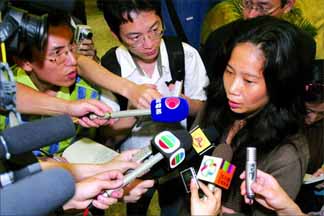
Tian Suiying (田穗英) said:
"The situation in the Solomon Islands is very bad.
I am grateful for the government for saving us."... Yesterday was when the first group of overseas Chinese returned from the Solomon Islands. At Guangzhou's Beiyun International Airport, more than 100 media journalists crowded around Arrivals Lobby A.
When the 13 overseas Chinese came out, they were warmly welcomed ... The huge reception party caught the 13 people by surprise. After a long and arduous trip, they did not have much to say to the reporters. Li Yulan had her 5-month-old son with her, so she was the favorite target of the media. But she did not want to frighten her young child, so she was not cooperating. The Guangdong provincial overseas Chinese association director Lu Weixiong volunteered to be the escort as he tried to shield her from the ever increasing number of reporters and photographers. At one point, he got mad and said: "Hey, the flashes can frighten the child!"
Because the media were too "anxious," the provincial overseas Chinese association people did not even get to present the flowers that they had gotten. So there was a farcical scene at the airport, in which the reporters were running to get interviews and the association workers were running to present flowers.
Obviously, this is a propaganda war. The target audience is not in the Solomon Islands. The grand prize is the hearts and minds of all the Chinese people around the world. Who do you think won this round? I think that you will agree that mainland China won this one hands down.
Here is one point: When there is an anti-Chinese riot anywhere in the world, all Chinese (whether they are from mainland China, Hong Kong, Taiwan, Cuba, Brazil, whatever) become the targets. The rioters will not check your passport and make exceptions. They will beat you up and burn your home/business down because you look like Chinese. Do not fool yourself otherwise.
Here is another point: This is not the first and it won't be the last propaganda war that Taiwan will lose handily to mainland China. Given the position of the current Taiwan government, they are ideologically incapable of contesting in this battlefield. In this case, to shower the displaced Chinese residents with kindness would have meant an admission of Chinese-ness, and that is a definite "No-No" in the present political climate in Taiwan. This is why Taiwan will continue to be stuck with these kinds of Hong Kong public opinion results -- it is impossible for the Hong Kong Chinese to like someone who treats you like you are nothing if you don't have a passport from them. The Solomon Islands message will resonate among the Chinese community around the world -- in Sydney, Toronto, San Francisco, Monterrey, Los Angeles, New York City, Boston, London, Amsterdam, Manila, etc.
So we are left with this photograph from the Solomon Islands:
The words on the banner are "Ambassador, you have finally come." The reference is to the mainland Chinese ambassador based in Papua-New Guinea. The Ambassador from Taiwan is nowhere in sight.
Related blog links:
Something Missing from the Solomon Islands Story China Matters
Identity, democracy and the Chinese "nation" Blood & Treasure